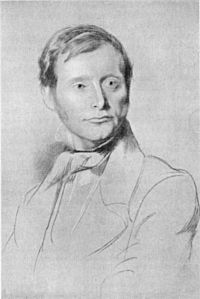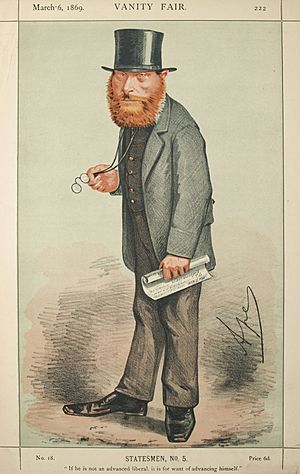William Edward Forster facts for kids
Quick facts for kids
William Edward Forster
|
|
|---|---|

William Edward Forster in 1851
|
|
| Chief Secretary for Ireland | |
| In office 30 April 1880 – 6 May 1882 |
|
| Monarch | Victoria |
| Prime Minister | William Ewart Gladstone |
| Preceded by | James Lowther |
| Succeeded by | Lord Frederick Cavendish |
| Personal details | |
| Born | 11 July 1818 Bradpole, Dorset |
| Died | 5 April 1886 (aged 67) |
| Nationality | English |
| Political party | Liberal |
| Spouse | Jane Martha Arnold |
| Alma mater | None |
William Edward Forster (born July 11, 1818 – died April 5, 1886) was an English businessman and politician. He was a member of the Liberal Party. He was also known for his charity work.
Forster was given the nickname Buckshot Forster by some Irish nationalists. This was because they believed he supported the police using strong force against a group called the Irish National Land League.
Early Life and Family
William Edward Forster was born in Bradpole, Dorset. His parents, William and Anna Forster, were Quakers. Quakers are a Christian group known for their peaceful beliefs.
He went to a Quaker school in Tottenham. After school, he started working in business, making woollen products in Burley-in-Wharfedale, Yorkshire.
In 1850, he married Jane Martha Arnold. She was the daughter of a famous headmaster, Dr. Thomas Arnold. Because Jane was not a Quaker, Forster was no longer officially a member of the Quaker community. However, his Quaker friends were understanding and remained close to him. After this, Forster became a member of the Church of England.
The Forsters did not have their own children. But in 1859, they adopted three orphans after Jane's brother passed away. These adopted children grew up to be important people:
- Hugh Oakeley Arnold-Forster became a Member of Parliament.
- Florence Arnold-Forster helped start a famous lace-making industry in Ireland. She also wrote a journal about her family and politics.
- Frances Egerton Arnold-Forster wrote a book about the names of churches in England.
William Forster was known for his kindness and charity. In 1846–47, he went to Ireland with his father to help distribute food during the Great Irish Famine. This experience deeply affected him. He then started speaking out and giving talks about public issues.
Political Career
Forster began his political journey in 1859. He ran as a Liberal candidate for Leeds but did not win. However, he was very respected in Yorkshire. In 1861, he became a Member of Parliament (MP) for Bradford. He was re-elected several times.
In Parliament, he spoke a lot about the American Civil War. In 1865, he became the Under-Secretary of State for the Colonies. This role involved helping manage parts of the British Empire. He also became a strong supporter of Imperial Federation, which was the idea of closer ties between Britain and its colonies.
Forster was very interested in improving education for everyone. In 1868, when the Liberal party came back into power, he was given the job of preparing a plan for national education.
His most famous achievement was the Elementary Education Act 1870. This law was a big step towards creating a system of national education in England. It aimed to make sure all children could go to school. The Act set up "school boards" in different areas. These boards were made up of elected people who would manage the new schools.
However, there was a big debate about religion in schools. Some people wanted schools to teach specific religious beliefs, while others wanted education to be non-religious and funded by local taxes. Forster tried to find a middle ground. The law included a "conscience clause," which allowed parents to remove their children from religious lessons if they wished. It also included the "Cowper-Temple clause," which said that schools funded by the government could not teach specific religious rules. This law was not perfect, but it laid the foundation for modern education in England.
Forster also helped pass the Ballot Act 1872. This law made voting secret, which was an important change for fair elections.
In 1875, he was offered the chance to lead the Liberal party, but he chose not to take it. In the same year, he became a member of the Royal Society, a famous group for scientists. He was also made Lord Rector of Aberdeen University.
In 1880, William Gladstone became Prime Minister again, and Forster was made Chief Secretary for Ireland. This was a very difficult job. Ireland was facing many problems, especially with land ownership and poverty.
Forster introduced a law called the Coercion Bill in 1881. This bill gave the Irish government special powers to arrest people who were suspected of causing trouble or being part of conspiracies, without a trial. He said this was the "most painful duty" he had ever had. The law was meant to deal with the growing power of the Irish National Land League, a group that fought for farmers' rights.
The Irish party strongly opposed this law. Forster had to travel often between Dublin and London to manage the situation and defend his actions in Parliament. He became very unpopular with some Irish nationalists, who gave him the nickname "Buckshot" because they believed he allowed the police to use force against crowds.
In October 1881, the leader of the Land League, Charles Stewart Parnell, was arrested. Soon after, the Land League was banned. Because of the strong feelings against him, Forster's life was in danger. He needed police protection in Dublin.
On May 2, 1882, Gladstone announced that Parnell and other prisoners would be released. As a result, Forster resigned from his position. A few days later, Forster's replacement, Lord Frederick Cavendish, was sadly murdered in Dublin. Forster offered to return to Dublin to help, but his offer was not accepted.
In the years that followed, Forster continued to be involved in politics. He often disagreed with Gladstone's policies, especially concerning places like Sudan and Transvaal.
William Edward Forster passed away on April 5, 1886. He was buried in Burley-in-Wharfedale.
Memorial
There is a memorial dedicated to William Edward Forster in his home village of Bradpole.
| Parliament of the United Kingdom (1801–present) | ||
|---|---|---|
| Preceded by Titus Salt |
Member of Parliament for Bradford 1861 – 1885 With: Henry Wickham Wickham 1861–1867 Matthew William Thompson 1867–1868 Henry Ripley 1868–1869 Edward Miall 1869–1874 Henry Ripley 1874–1880 Alfred Illingworth 1880–1885 |
Constituency abolished |
| New constituency | Member of Parliament for Bradford Central 1885–1886 |
Succeeded by George Shaw-Lefevre |
| Political offices | ||
| Preceded by Chichester Parkinson-Fortescue |
Under-Secretary of State for the Colonies 1865–1866 |
Succeeded by Charles Adderley |
| Preceded by Lord Robert Montagu |
Vice-President of the Committee on Education 1868–1874 |
Succeeded by Viscount Sandon |
| Preceded by James Lowther |
Chief Secretary for Ireland 1880–1882 |
Succeeded by Lord Frederick Cavendish |
| Academic offices | ||
| Preceded by Thomas Henry Huxley |
Rector of the University of Aberdeen 1875–1878 |
Succeeded by The Earl of Rosebery |
Images for kids



